#energy restore
Photo
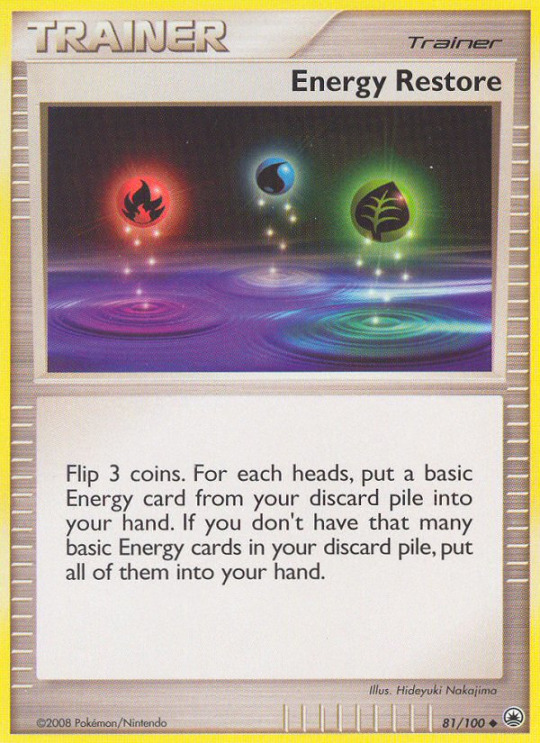
50 notes
·
View notes
Text
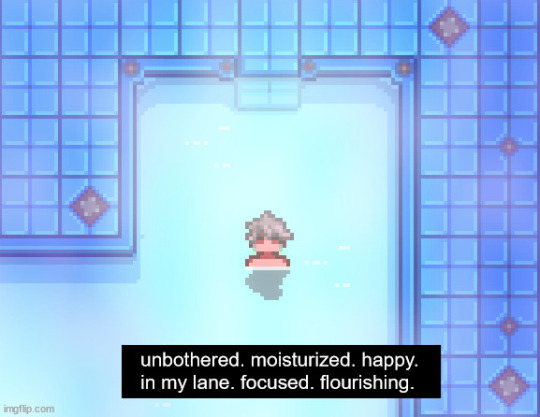
is this meme anything.
#stardew valley#my pal is just vibing#also restoring health and energy after mines lol#driftcreates#gleam
1K notes
·
View notes
Text
I need My Dear Gangster Oppa to believe in episode previews because as soon as I saw Guy's shirt,
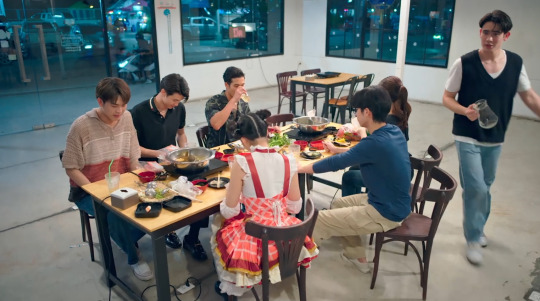
I knew Boss had drugged them! NO, BOSS!

Tul will not be pleased with this development!

But he will still love Boss because Boss didn't want to do it, and Tul already quit the gangster life to be happy.
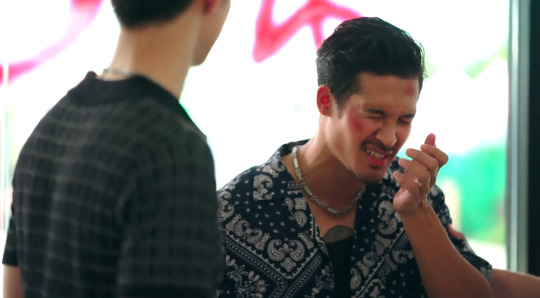
So let my boy be happy!

Let him be just as happy as his color-coded boss.

Tul deserves the Tew treatment

He deserves to be smitten.
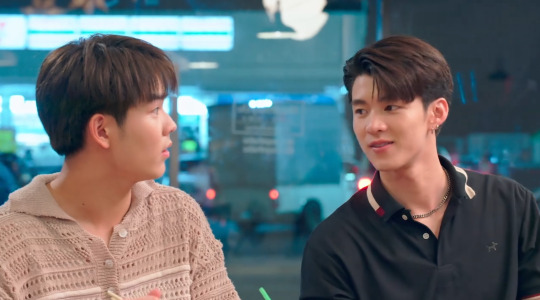
He deserves the right to be playful.
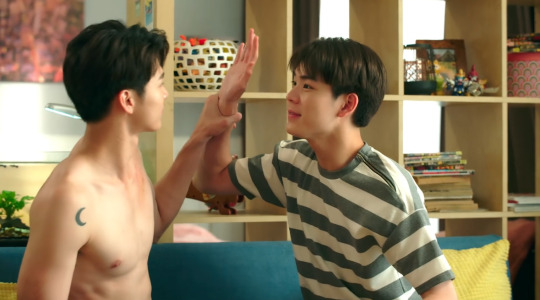
He deserves the right to be taken care of.

(look at Guy in pink because he is in love while both guys had some variation of black/white on this episode because they are blending their love)

Tul also deserves to have that blurry shot while we see two figurines that represent the two characters in their color scheme of dark versus light.
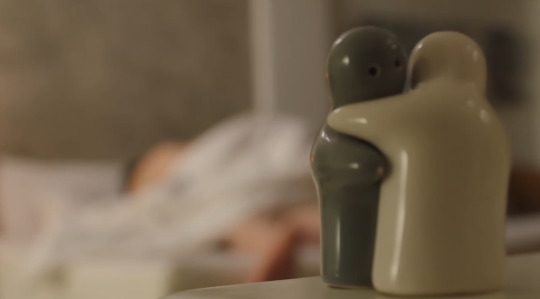
So even though this show lacks previews, next week's agenda is rescue Guy, forgive Boss, and let Tul be happy.

Because I'm pretty sure my wife is a badass detective or something, and is going to save the day because she is my wife and a badass.
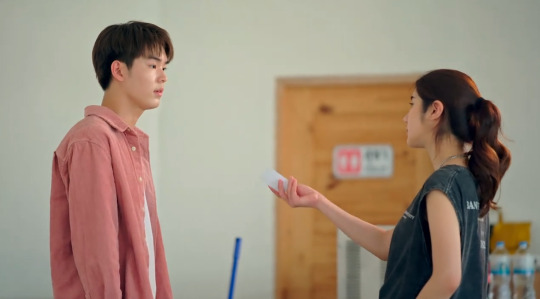
I love her.

This was a Tul and Phai appreciation post.
#my dear gangster oppa#color coded boys in love#those figurines restored all my energy#the colors mean things#and they mean by wife will save the day#and Tul will be happy
99 notes
·
View notes
Note
Do Seb and Othello get cuddly and sweet together too or are they more besties and just hang out??
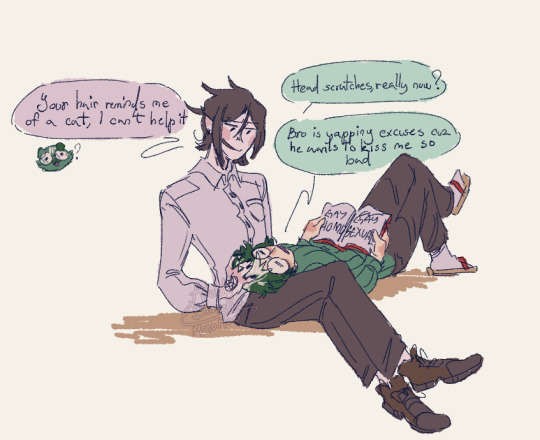
When their wife (grell) is out having a ladies night with madame red and mey-rin, yeah they do cuddle sometimes
#they're restoring energy together so they can team tackle grell when shes home#Seb is also the only one who understands Othello's nerdy talk as well#like no need for translation they just go full on science talk and Sebastian gets it#black butler#kuroshitsuji#black butler art#black butler fanart#kuroshitsuji fanart#kuroshitsuji art#sebastian michaelis#grell sutcliff#grelle sutcliff#othello#black butler sebastian#black butler othello#sebagrellthello#art#my art#doodles#fanart#mono ask
57 notes
·
View notes
Text
Yesterday’s leaks really did happen, huh.
Anyway.
Tenko is still alive, AFO himself confirmed that when he manifested a hand to keep ‘some echo’ of him suppressed. He lost Decay, that is all. ‘Tomura Shigaraki’ as in the creation of AFO, his vessel, someone who was filled with hate and etc. got dismantled, but the real identity is still there.
Tenko will awaken Restoration and will restore Izuku’s hands.
Kurogiri’s portal is turning white, so that must mean Shirakumo is somewhat back. Personally I think that since Kurogiri acted as a herald of each phases of this arc, the fact that Oboro (someone who cares about Tomura/Tenko, by the way) seemingly got saved is the symbol of all the other villains being saved from this point, including Tenko.
I LOVE the twist that Decay is actually part of Overhaul, and also Horikoshi wants revenge for every panel Bones ever cut out, I guess.
The hand that AFO manifested on his mouth is Yoichi’s! Which is funny, ‘cause. This is such a dominant gesture, and he chose Yoichi for that? Okay!
#no it won’t be eri who will restore his hands#she doesn’t have any energy and also why would anyone let her go on a battlefield#stop. there is a much better option!!#bnha#bnha spoilers#bnha 419
53 notes
·
View notes
Text
DEO: Department of Extra-normal Operations
This will be an essay that looks into the ethical problems of the DEO. For the purpose of this essay, I am not concerned about the showrunners reasons for their decisions for how the show presents the DEO. I care only about examining the worldbuilding and stories inherent within the world created. So let's dig into some philosophy and theory. Whee! [Minor spoilers]
To start, this department was first created within the Superman/Supergirl universe in order to analyze alien activities after Superman reveals himself on Earth. It's made in retaliation to the appearance of powerful aliens that those in power deem possible threats. Already, the DEO's beginnings are rooted not in true protection but in stopping and eradicating what those in power deem a threat. It's roots start with dubious ethics.
Let's examine it's history:
It was led by Hank Henshaw, who is vehemently anti-alien. Henshaw is also slated to have ties to Cadmus, which experimented on aliens and attempted several rather horrific and genocidal attacks on aliens. (Note that in Supergirl: Season 2, Kara and Lena thwart Cadmus' activities. Lena Luthor saves the day by modifying an alien killing virus to be harmless to all living creatures. Bits and pieces of the worldbuilding around Cadmus showed that the aliens experimented on came from DEO facilities.)
Henshaw dies when Jeremiah Danvers "kills" him when saving J'onn J'ozz, who then takes Henshaw's place until exposed. He recruits Alex sometime before his exposure (Season 1). After J'onn is exposed in Season 1, Lucy Lane takes control. Then after J'onn helps Supergirl defeat the murderous Kryptonian Non, J'onn received a presidential pardon and was reinstated as director. He kept Henshaw's guise for publicity sake.
The show makes it clear that J'onn choses to be the Director to change the DEO. Yet, what evidence is there that this actually happens?
So that's the basic history.
We have a clandestine agency that has unethical procedures that doesn't change under a new director.
The DEO picks up aliens and throws them in a cell to never be seen or heard from again. This would likely terrorize the alien neighborhoods. This is never truly address in any meaningful manner by the Superfriends or Kara.
In fact, if anything, the show positions the DEO as being Good if Alex, J'onn, or Lucy are in charge (Kara, ironically is not in charge of the DEO at any point). However, the DEO becomes Bad if Lex Luthor or Lauren Haley or the real Hank Henshaw are in charge.
This creates a rather large ethical problem.
First of all, the worldbuilding builds up the argument that certain people are good and certain people are bad. The person we see skirting between those two extremes, and living in a morally grey area the most, is Lena Luhor. For the purposes of this essay, I'll put a pin into Lena's characterization and focus only on the DEO.
Secondly, we are told again and again what Kara/Supergirl's ethics are: justice and truth. Yet when we examine Kara's actions within the context of her DEO Supergirl duties, we are confronted with the following:
She must hide her identity, even from her best friend Lena, and thus deceives regularly. Her reasons for not telling Lena are rooted in the pressure from those at the DEO to not tell Lena but also in Kara's intense fear of loss. However, Kara will demand truth from others despite her hypocritical actions. This doesn't seem to fit solidly in the "good" category.
Her "justice" is defeating criminals. Humans go to the police to eventually have a fair trial. However, aliens are not afforded that same right. Her justice for aliens becomes judge and jury. Since she professes to "not kill," she at least doesn't extend that to executioner. This again doesn't fit solidly in the "good" category.
Thus, by examining Kara/Supergirl's actions, we see a disconnect with what the show claims is "good:" truth and justice. Yet, there is no true justice for the aliens fought and captured; their rights are rescinded (if they had any at all).
This is why the show must tell us who is "good" and who is "bad," because people's actions do not fit the show's claims of what "goodness" is versus what "badness" is. Thus the worldbuilding ends up defining Kara's actions as always "good" even if those actions cause harm to those around her.
[Side note: This isn't to say that Kara is "bad." It is to say that the binary within the show's worldbuilding lacks nuance for the complexity within Kara's understanding of the world and how she acts within that understanding. This binary simply cannot allow for such a complex examination as there is no room for it.
Because of this binary, the show actually butchers Kara's character to make her past "not good" actions as somehow "right" and "good" in the end. We see this with how Kara's harmful actions toward Lena (the lying, duplicity, deception etc) is turned into "I did just one mistake" when it wasn't one mistake. It was years of harm, but because the show paints Kara as "good," Kara is not allowed growth.
This binary of good versus bad is already nonsensical in the worldbuilding since Lena Luthor's very existence throws this entire frame out the window. Her actions, always with the intention to do the least harm and try to improve the world, don't fit neatly into the binary. The story often punishes her for this. (She breaks the binary too much I suppose.)
Yet when other people's actions fail to fit neatly into the binary, the show whispers: "Hush, don't look or think, believe us when we say this person is good and this person is bad.']
To reiterate: It's okay to capture aliens and disappear them without any right to trial If the Superfriends are doing it. This good/bad definition collapses ethics into meaningless words since the activities and procedures of both the "good" people and "bad" people don't differ in terms of impact on alien communities. This lack of differentiation is why we must be told who is good. Otherwise, how would we know?
To dig a little deeper, in Season 4, when Kara is on the most wanted list, she learns very little about the true plight of aliens. During this time, the DEO becomes "bad" under the control of Lauren Haley. Lena Luthor and Alex Danvers, who are both working with the DEO still, also work against the DEO but only to clear Kara's name. So justice is done for Kara's sake but not for the other impacted alien communities.
Once Kara's reputation is restored and she's no longer deemed an "enemy of the state," Kara returns to working with the DEO, as it is now labeled as "good" again because Alex is back in charge.
Ironically, the only person in Kara's friendgroup that questions the DEO is Lena Luthor. (Who in Season 5 will have her 'villain arc' only to be redeemed to the good side again at the end of Season 5. She's the only character, who is labeled a villain at one point, that is allowed true redemption.)
We learn very little about what alien communities actually think about the DEO and about Supergirl in particular. The most we get is the Children of Liberty plot line of Season 4; however, this plot line doesn't ever give us a solid viewpoint from impacted alien communities. Instead, we are confronted with:
We are told what alien communities are like and how lacking in rights they are. Very little of this is shown directly outside of "criminal aliens." Or the brief glimpses within Manchester's arc. However, Manchester is viewed as 'in need of redemption' despite having very real grievances with the state of things. The show then tells us that Manchester is 'bad' and the 'good' J'onn and friends must stop him.
The second time we see alien daily lives is Nia's return to her hometown, which is attacked by supercharged humans. This blended town of aliens and humans serve as an outlier. Nia actually admits that the town is unique and not representative to most aliens' experiences. So again, we don't see a direct experience of alien life in National City or other major cities.
Aliens either have significant powers that humans can justifiably find scary or they are human-like with little to no powers. Both are treated the same for the sake of the Children of Liberty plot line, which serves as an immigrant allegory. @fazedlight and @sideguitars did excellent analysis on this and the problems of these allegories based on the worldbuilding and story itself. (Note: thank you to fazedlight for finding the post in question! Click here o read their analysis.)
This makes it easier for the show to pretend that the DEO is "good" when the Superfriends are in charge. Since we don't meet alien families harmed by the DEO's actions, we never truly get an alternate perspective.
Even Lena Luthor's critique of DEO is spat upon by the story, where her alien friends fail to truly counter her valid points. Instead, it's presented in the good/bad binary, which erases all nuance and ethical considerations.
Let's also consider the start of the Supergirl career. Kara is captured by the DEO 12 years after her initial appearance on Earth. However, prior to this moment, we had learned that Kara had nearly been taken by the government -- specifically Henshaw's control of the DEO. Jeremiah Danvers agrees to work for the government in exchange for Kara's freedom from being a government asset.
However, her saving Alex's flight puts her in the crosshairs of DEO, and eventually she is captured. Upon which she learns J'onn is in charge (not the original Henshaw), and J'onn's goals are revealed. He allows Kara to fight her first alien fights as Supergirl. Here we see that J'onn's methods have not actually changed anything about the DEO.
The alien fight results in that alien being captured. Supergirl/Kara never hears what happens to the alien she fought and captured. No thought is given to the rights of that alien or if a fair trial will be given. Instead, we are told the alien is a "criminal' as if that somehow justifies the brutal treatment.
After Alex reveals she's an agent with the DEO, Kara fully trusts the agency.
So Jeremiah gave up his life to make sure Kara wasn't being used by the government, only for Kara later on working for the DEO, which is part of the government. Thus Kara ends up used by the government after all. The irony here.
Kara's blind spot here is:
she's privileged. A white-passing, human-passing alien. It's easier for her to hide as a human and not be clocked as an alien. Also, she's white, so less likely to deal with the complications of racism. The most she has to deal with is sexism and the DEO's procedures. This means she doesn't experience the worst the DEO and the systems that uphold it dish out to aliens.
Kara hasn't really interacted with aliens outside her friend group. She's relatively sheltered since coming to Earth due to Kal placing her with the Danvers and having to hide herself. She has no real knowledge of how aliens survive on Earth. This means she has nothing in which to compare the DEO's claims.
She blindly trusts Alex when it comes to DEO.
We don't see Kara questioning what happens to aliens until Season 3 (if it happens in season 1, I apologize as that season is a bit hazy for me). Here Psi saves Kara's life during a perilous mission. Kara then asks about her accommodations and finds out she has no window in her cell. She then demands Psi be given a cell with a window.
However, notice who Kara takes with her on that Season 3 mission: LiveWire (human but due to an accident became Livewire, so she's not an alien but a meta-human) and Psi (who is labeled a meta-human). So the two incarcerated people that Kara chooses are meta-humans and not actual aliens.
So again, we never see Kara interact with aliens outside her friend group unless she is interrogating them. Once the DEO is done with interrogations and the case "closed," those aliens disappear into these windowless cells. Which, need I remind that solitary confinement is labeled as torture for a reason?
Yet that is where aliens that are dubbed "too dangerous" end up by those with power. No rights given; left trapped in solitary confinement with (likely) no windows to never see the light of day again. Of course, because we are told the "good" people do this, it is thus "okay," despite it not differing in methodology with what the "bad" people did.
2. DEO's procedures don't match law. This is especially true when alien amnesty is put into law.
DEO changes NOTHING about their procedures after alien amnesty is put into law. This means that although aliens now have a legal right to a trial, the DEO does not provide this for them. No captured alien is given this right.
This means the DEO doesn't operate within the law.
So if the DEO can disregard laws if they so desire, then what is to stop them from terrorizing any citizen regardless of whether that citizen or alien or human?
What exactly is the ethics of the DEO?
Is the ethics dependent on who is in charge? But if one compares the tenure of the directors: Henshaw, J'onn, Lucy, Alex, Lauren, and Lex -- we see no difference in how the DEO acts.
They all target aliens and give them no rights. The aliens vanish into the cells never to be seen again. This includes some meta-aliens.
Some will claim that while the Superfriends are in charge only criminal aliens are thrown into solitary cells with no hope of release.
But that begs the question: Why do the Superfriends get to be judge and jury and/or executioner? What makes their decisions good but Lauren Haley's or Lex's or the original Hank Henshaw's decisions bad?
Why do the Superfriends get to decide that criminals get no right to a fair trial? Why do they not interrogate what is causing the criminal behaviors in order to change the conditions to avoid aliens resorting to "criminality" as defined by them?
In the end, it does not matter why an alien or meta-human engages in what the state has deemed "criminal" behavior; the methods used in capture and the end result is the same regardless.
The families of captured aliens see the same results regardless of whether "good" people or "bad" people are in charge of the DEO.
While alien amnesty is in law, the DEO, who is under Superfriend control at the time, does not alter their procedures to give the aliens they capture any rights. We never see the aliens or meta-humans captured ever given a fair trial. Nor do we see any programs to reform "criminals" or give them any chance at parole or redemption.
The only method for dealing with aliens and meta-humans uses a carceral prison system that is based in solitary confinement torture. Even the interrogation procedures used have elements of torture to them. In fact, many of the "interrogation" procedures use leading questions to entrap and force a confession under duress. None of these methods are conducive toward reform or fixing a system that deprives those captured of all rights.
Alternate systems for dealing with criminals are never explored. We never see transformative or restorative justice utilized. Both systems would require extensive dialogue with the communities harmed by the "criminals," and if there is one thing the DEO fail at consistently is dialogue with the impacted communities. Instead, their approach is top down, where their ideas of what is right and best is pushed down upon the communities they claim to serve.
Part of this lies with the fact the Superfriends can't engage in dialogue as long as they adhere to the oppressive methodology and practices of the DEO. Reform has failed to alter the ethical violations within the DEO. Alex Vidale wrote an excellent book called The End of Policing, which digs into the attempted reforms for police and how they have consistently failed. Vidale writes:
“At root, they [reformers] fail to appreciate that the basic nature of the law and the police, since its earliest origins, is to be a tool for managing inequality and maintaining the status quo. Police reforms that fail to directly address this reality are doomed to reproduce it.”
The DEO at its root was created to manage the inequality inherent between human rights and the lack of any rights for aliens. It was also created to control aliens and maintain a human status quo. The Superfriends attempt at reform fails to address this reality, and thus were doomed to repeat it.
Vidale continues:
“Police argue that residents in high-crime communities often demand police action. What is left out is that these communities also ask for better schools, parks, libraries, and jobs, but these services are rarely provided.”
Services to better the conditions of so-called "high-crime" communities are not shown to be rendered in the Supergirl world, while the Superfriends are in control of the DEO. It is not more policing that is needed, but more services which do not get provided for most of the show's story and worldbuilding. Thus, the communities that struggle with survival, who often must resort to "illegal" or "criminal" ways end up with only punitive measures that continue the cycle.
It's only in Season 6 when the Superfriends are no longer with the DEO that we start to see them engage in dialogue with the community in general (Kelly's arcs in particular touch on this for the lower income area that she tries to help, which is shown to be a mixture of nonwhite humans and some aliens).
If J'onn and others truly are seeking to reform the DEO, then that requires them to be in dialogue with the affected communities and to put forth new procedures that provide rights to those impacted. This is never done.
3. The DEO suffers no consequences for its actions.
The "Bad things" that happen under the "Bad" directors -- original Henshaw, Lauren Haley, Lex -- aren't ever addressed. Nothing really changes; instead the "Good" guys get back in control and things continue.
Was any reparations made for those harmed by the bad actors? Are the families impacted ever given compensation? We see some aliens rescued from Cadmus in Season 2 and Lex's Power Plant in Season 4, but what of the families of those murdered by Lex and Henshaw? The show fails to address this.
Instead, we are told that the "good" people are now in charge again and only "criminals" are being taken and incarcerated with no rights.
The concept of "criminality" depends entirely on who is in a position of power to dictate what constitutes "criminal" acts. One of the biggest problems with "criminality" as a concept is that it fails to interrogate the why these behaviors happen. What led to the "criminal act?" Are the people engaging in the act just "bad" people?
Often when basic needs are not being met, people may engage in acts of desperation to meet those needs. These actions may fall under what that society deems as "criminal." However, if the people's needs were met, then they wouldn't need to engage in desperate acts to meet their needs.
Another reason for "criminal" behavior stems from people who lack rights in a society. The oppressed will often fight against their oppressors using a mixture of methods (sometimes nonviolent, sometimes violent) in order to win their rights and transform society for the better. Until they win that fight, their actions are labeled as "criminal" by those in power.
Some rarer individuals may engage in acts of harm because they enjoy it such as Lex. However, this is actually very rare. Property crime and burglary is far, far more common. Yet, even those engaging in horrific violent crimes are still afforded a fair trial. Something aliens in the Supergirl universe are never given.
There's quite a few scenes where the aliens fought by Supergirl are engaging in robberies/burglaries or other property crimes. Those that seek to violently mass murder is actually rarer, and often the big villain of the season. At no point does anyone in the show reckon with the reasons someone may choose to engage in "criminal" behavior. Instead, all "criminals" are painted as "bad" regardless.
J'onn professes to be "reforming" the DEO to stop its reign of terror among alien communities. Yet, the most crucial components in changing an oppressive system? We don't really see him utilize them until Season 4, but by then the DEO is in the hands of Alex, who continues the procedures put into place by J'onn,
Paulo Freire writes in Pedagogy of the Oppressed concerning the "radical" as in the person seeking to end an oppressive system:
"The radical, committed to [human] liberation, does not become the prisoner of a 'circle of certainty' within which reality is also imprisoned. On the contrary, the more radical the person is, the more fully he or she enters into reality so that, knowing it better, he or she can transform it. This individual is not afraid to confront, to listen, to see the world unveiled. This person is not afraid to meet the people or to enter into a dialogue with them."
J'onn recognizes that the DEO's methods are wrong and unethical. When he takes over and poses as Henshaw, he wishes to transform the system. Except, this is where he fails, because he justifies his changes by claiming that now the DEO only locks away forever criminal aliens.
No thought is given as to why these aliens are making these decisions. What pushed them to rob a store? What pushed them to attack? Did they feel like they had no other choice? Was there no opportunities other than to rob for what they needed? Or to fight against a system that they deem is harming them and their communities?
These questions are not analyzed at all by J'onn or the Superfriends. They do not listen to those most impacted by the DEO. The only time we see J'onn seem to listen is when he is trying to work with Manchester in Season 4, but that results in Manchester being presented as bad in the end, while J'onn is shown to be good. Where he tried to redeem Manchester.
Yet Manchester had valid points about the treatment of aliens. His methodology in fighting back against what he saw as oppressive system is problematic, but he listens far more than Kara and the Superfriends to those being harmed by the systems that created the DEO.
So J'onn and the other Superfriends are failing to engage in dialogue with those harmed by the DEO. They fail to unveil what is truly horrifying with the DEO: incarcerating aliens in solitary confinement with no fair trial and no hope of ever seeing the light of day again.
The justification that because they are "criminals" this is somehow okay erases all the contributing factors that may make up the circumstances that lead to the "criminal" behavior. Nothing is truly done to remedy the situations that may drive someone to what the state labels as "criminal" behavior.
It also unveils a horrible truth. Any alien (or meta-human or even human) can be marked an "enemy of the state" and thus a "criminal," where all rights they had prior be rescinded. We see this happen to Supergirl in Season 4. The only reason she isn't locked away in a cell with no windows is because Alex and Lena don't allow it. Unlike most aliens the DEO fights to find and capture, Kara has people fighting for her.
But what about every other alien? Who is actually fighting for them?
J'onn's attempt to reform the DEO falls into the biggest trap for all radical liberators: it is all too easy to become complicit with the system at be and justify this than it is to actually change it from within.
As Paulo Freire puts so succinctly:
“Oppression is domesticating. The gravest obstacle to the achievement of liberation is that oppressive reality absorbs those within it, and thereby acts to submerge human beings' consciousness.”
Thus the DEO fails to be reformed. It's reign of terror in alien communities is not truly diminished. Nor does those fighting to "reform" the DEO engage in any dialogue with those communities to determine their needs or ways to improve conditions to decrease the need to resort to "criminal" activities.
In the end, the DEO stays an oppressive, clandestine agency that has no transparency, answers to apparently no one, takes away the rights of those they catch, and disregards laws as they please.
What the Superfriends have failed to learn and understand is that oppression cannot be defeated by reforming the system that causes the oppression. In other words, liberation cannot be achieved be reform alone.
This is why the destruction of the DEO in Season 6 is perhaps the best result at least within the rules of the Supergirl world. The Superfriends could not reform it from the inside, and by trying to do so, they ended up complicit to a harmful system. As long as they were tied to the DEO, the Superfriends would never be able to live out justice and uplift the rights of aliens and humans alike.
ADDENDUM: However, the Superfriends decision to go full vigilante is a whole other can of worms. They do attempt to be transparent in their actions for the communities they serve, but is there a way for people to hold them accountable? That isn't fully addressed. However, that would require a full essay, and this essay is only about the DEO.
#I know it's CW who failed to ever think about these topics#I wanted to get philosophical about this#if I had more energy I'd give the good/bad problem further depth as it deserves more examination than I gave#The simplification of ethics to good/bad based on who the show labels as 'good' and 'bad' is a bastardization of ethics#I love me some paulo freire#trying to reform a corrupt system from within runs the danger of becoming part of that system#Liberation cannot be achieved by reform alone#I wrote this mostly as an exercise in examining worldbuilding within a liberatory framework#I'm solidly in the DEO cannot be redeemed or reformed camp and needs to be completely taken down#A new method for dealing with dangerous aliens that respect their rights is needed#Restorative or transformative justice is my jam
27 notes
·
View notes
Text
It's true, there's nothing “soft” about being broke! 😩 and nothing luxurious about faking the aesthetic!
📌Please don't confuse our tough love with discouragement! We want you to shoot for the stars 🌟 and get the life you desire but we would be terrible accountability partners of we didn't give you the real! 🫶🏽
With the right mindset and proper tools it will come in abundance! 💸😍💃🏿🤑
🚨We are just reminding you to not get lost in the aesthetics to the point where it drains you and your bank account!
Here are some simple yet game-changing tools to help you win! Stay committed, let it inspire you! (click here for tips)
#black women in luxury#classy black women#black women in femininity#black luxury#feminine energy#Finance tips#credit restoration#saving money#Self help#self discipline#self improvement#soft girl era#the soft life#resources
45 notes
·
View notes
Text
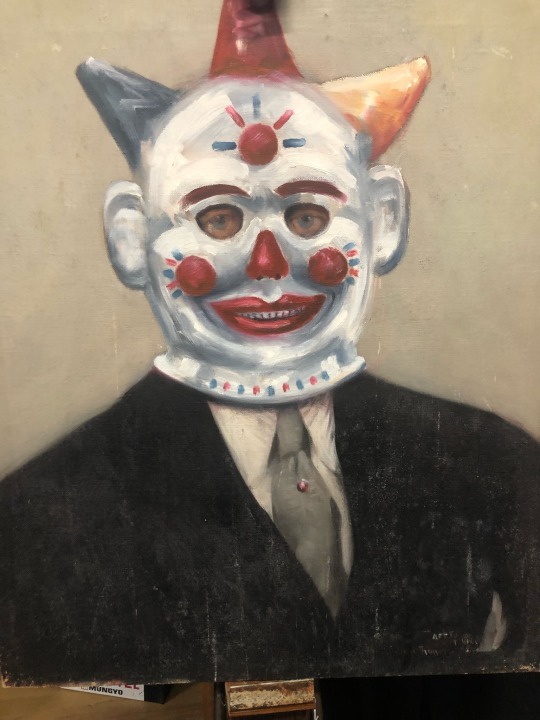
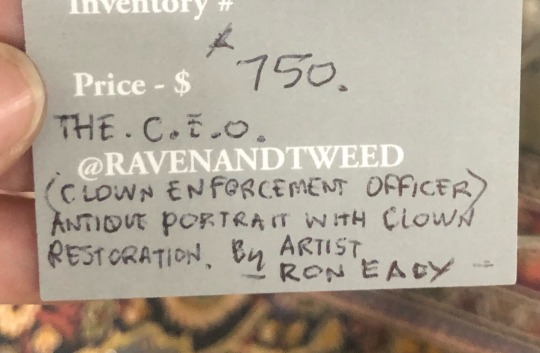
#shiftythrifting#thrifting#submission#clown restoration#clowns#clown enforcement officer#big energy of an indescrible type#possible scp
340 notes
·
View notes
Photo
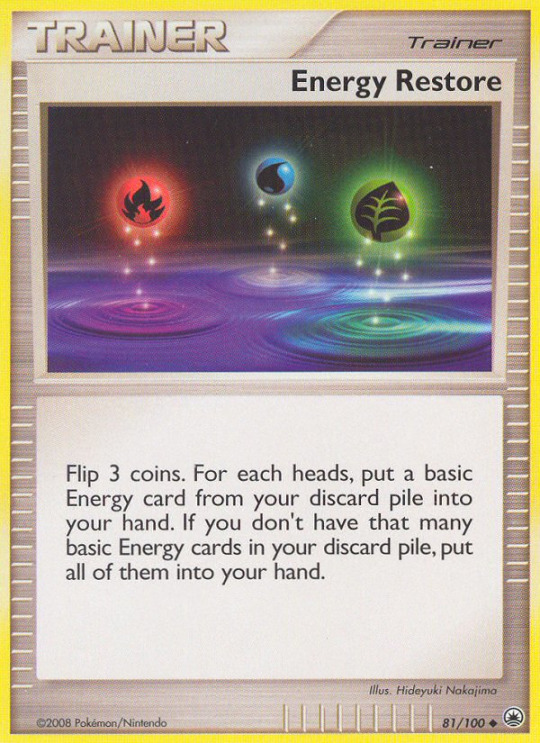
34 notes
·
View notes
Text
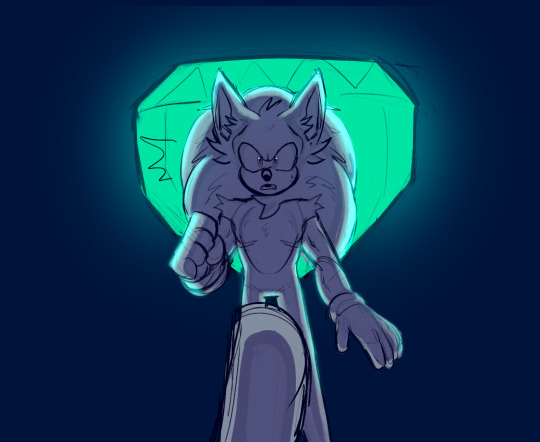

Anyways, I did have these two saved thankfully!
Heart Of Chaos AU is about Sonic (Spikes) being the reincarnation of The Master Emerald thanks to Tikal's wish for peace. He is filled to the brim with Chaos Energy and, if in enough distress, that chaos energy can be corrupted and trigger his Dark Form, which can cause a big ass doomsday since he is directly linked to the Chaos Emeralds and will corrupt them as well.
So...imagine if radioactive energy just started to kill everything living...Not ideal.
But yes! that's the synopsis of Heart of Chaos. :]
#also yes the au has to do something with actual Chaos. he is a recurring character because Spikes and it were connected to each other.#Chaos wasn't IN spikes but spikes' is linked to Chaos anyways#when Eggman got Chaos out of the crystallized lake it was trapped in Spikes immediately felt that.#and as Chaos grew angrier and stronger. it began affecting Spikes' control on his own emotions and chaos energy triggering his dark form#when Chaos gained his last form. but with help of Tikal . Knux. Ames and Tails they were able to reach Spikes and Spikes was able to#calm down Chaos#anyways way to be traumatized when youre 12 huh!#dw he isn't a silly emo boy. but he does have insecurities about hurting other people after tHAT shit happened and he and Chaos destroyed#that whole city#thankfully Spikes was able to restore the corrupted chaos energy to being okay chaos energy and not leave the entire place being#the literal elephants foot LMFAO#my art#heart of chaos au#tikal the echidna#sonic the hedgehog#knuckles the echidna
56 notes
·
View notes
Text

huecember 15! could be better but I'M FINALLY FYCKING FREE WAAHHAAHAHAHA
and now that I've completed huevember/huecember for 2023 i've compiled some stats under the cut
total pieces: 25 (missing 5)
fanart: 14
non-fanart pieces: 9
ocs: 2
most figures: day 18 (8 total)
pieces with 2 figures: 5
pieces with 1 figure: 15
pieces with no figures: 4
average amount of figures per piece: 1.32
by fanbase: aurora (3), scythe (2), e2068 (2), mob psycho 100 (2), murder drones (1), sorry to bother you (1), leverage (1), calvin & hobbes (1), mario (1) (9 total)
true huevember (colors ONLY from one hue): 8 i think ()not sure about citizens
pieces on time (before midnight of the next day): 8
pieces late: 17
earliest piece: day 2 (skateboarding), 10:56 pm before midnight
latest piece: day 8 (verm), almost 3 days after midnight
favorite: day 14
least favorite: day 12
#it's the uhhh part where mob restores that girl's writing btw. that almost made me cry. may revisit if i have the energy#glow effects look awful but i kept falling asleep at 11:30pm. i aint figuring that out#shoves the several secret santas i need to do behind my back#man. should have done waluigi#squent post#squent art#art#fanart#mp100#mob psycho 100#shigeo kageyama#kageyama shigeo#mob psycho fanart#mob mp100#huevember#huevember 2023#huecember#huecember 2023#huevember 15#huevember day 15
20 notes
·
View notes
Text
Oh my god. Rings being little chaos energy batteries makes so much sense. It fits with the draining of rings when someone goes super with the emeralds. You're using up chaos energy.
#continuation of prev post#text#it also ties in to chaos energy being a lifeforce & rings keeping you from dying#i need to play unleashed but fixing the emeralds helping restore the earth and chaos energy playing a role in that#i guess u can say a ring is a circle of life haha#running out of rings while being super and the emeralds suck up your remaining chaos energy/life force like a caprisun#im sure you can tie this to warp rings too but idk enough about them other than theyre weird and archie had em#rambles
13 notes
·
View notes
Text
Dear People In The Spooky Month Fandom were you always an avid Halloween enjoyer or did you like it well enough on its own but now feel a surge of anime-level strength and power flood through you every time you so much as hear the name
#I mean it was always my second favorite holiday#But now listening to stuff like Nightmare Before Christmas actively restores my energy#spooky month
7 notes
·
View notes
Text
yeah okay i’m actually unbelievably angry about retconning out whole seasons. so funny how many people are celebrating it as if it isn’t an incredibly egotistical and supremely lazy writing move that’s a slap in the face to anyone who’s cared about the show in the past seven years
#restoration spoilers#like there are literally ways you could have essentially the same outcome that actually respects previous canon#burnie has literally never been capable of respecting pre existing canon tho so why are we surprised#i’m so glad that people who haven’t even been a fan of the show for seven years are happy about it tho. real happy for you all.#like. the welcome home cheater thing is 100% a joke i don’t care that people left the fandom. i actually honestly prefer the fandom to be#small and dead. thank you for leaving now i get to play with my dolls in peace#but to be like. yeah i put no energy into this thing but now i’m happy that it’s gone. whatever new contingent of rvb fans for me to hate#just like. imagine if i championed retconning out season 13 because i didn’t like it. fucking. hello.#i really could not care less about what this season is going to have to say about rvb canon#i am going to continue to consider the old timeline canon and this to be burnies weird self insert fanfiction#until further notice
22 notes
·
View notes
Text
hey. why did izzy not get soup?
15 notes
·
View notes